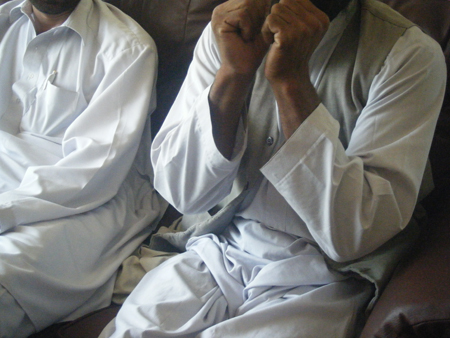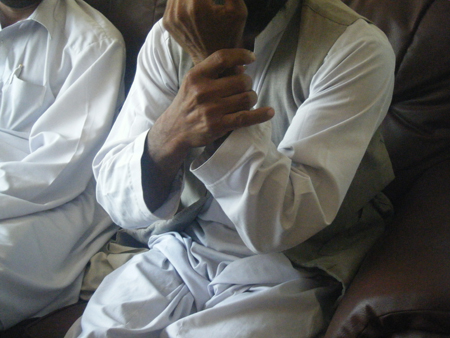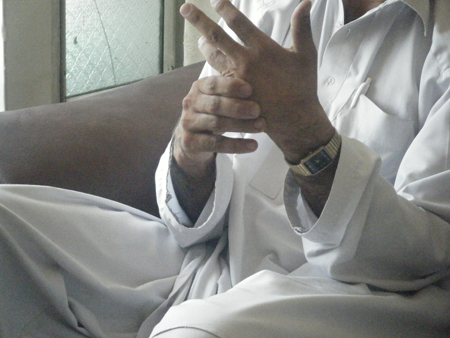
* Scroll down for the Pentagon's response.
Text and photos by Jonathan Horowitz, a consultant working in Afghanistan for the Open Society Institute.
I recently sat down with an Afghan farmer who had been detained by US forces. He shared his experience at Bagram and his views on US detention policies.
For security purposes, I will refer to him as Wasiq. His recount is extremely relevant as President Obama's task force reviews current US detention policies and provides recommendations for moving forward. The report, supposed to have been released last week, has been delayed six months.
In order for US forces to stabilize Afghanistan and end the conflict, the US detention policy needs to change. Afghans frequently cite the way the US captures and detains people as their main complaint against the US, second only to civilian casualties.
Background:
Wasiq is from a village 30 kilometers outside of Jalalabad. Earlier this year, he was arrested at his home along with his two brothers. Wasiq and one of his brothers were briefly detained at the US-controlled Bagram Internment Theater Facility. His other brother, who courageously established and ran girls' schools during the Taliban rule, remains at Bagram. He's been there for four months.
Wasiq participated in the interview with his nephew, a doctor who runs a medical clinic, who will be referred to as Dr. Khan.
Interview:
How long were you at Bagram?
Mr. Wasiq: I was there for about 10 days. I was captured in early March 2009.
 Mr. Wasiq describing how he was handcuffed when arrested by US forces. Credit: Jonathan Horowitz
Mr. Wasiq describing how he was handcuffed when arrested by US forces. Credit: Jonathan Horowitz
How were you arrested?
Mr Wasiq: I was in my room at home, around 10pm, and it was obvious to me that something was moving on the roof. I thought it was raining or maybe women were on the roof collecting things they put up there.
When I went out to see what was going on I saw Americans in their uniforms. They started speaking through a loud-speaker. I went to open the front gate to our compound and the soldiers started shooting - I'm not sure if they shot at me or in the air. I jumped out of the way and told everyone, "Don't go outside, the Americans are here."
After that I heard an explosion. The soldiers blew up the gate and entered the rooms and they told me not to move. They did this with a gun pointed at me. Then they handcuffed my hands behind my back, put a hood on me, and laid me on my stomach. I was like that for three hours.
Without asking permission they entered our house. The Americans were accompanied by private security soldiers that work for Americans, not for the Afghan government. They were completely wild.
I was in my room with my wife and three children and the soldiers came in with their guns pointed at me, telling me to leave my room. The youngest of my children was two years old. Some of my children still wake up at night shouting and screaming because of the raid.
Dr. Khan: I arrived to [his home] the next day. The door had been exploded like my uncle said. About 50 people share the compound, and there was a section devoted to teaching adults who missed classes during the Taliban's rule. Windows and doors were broken, dishes were destroyed, and the carpets were destroyed. Even the clothes lines were torn down. Everything was upside down. I would say 70 percent of the property in the house was destroyed.
Did the U.S. soldiers say why they arrested you?
Mr. Wasiq: They didn't give me a reason when I was captured. At the Jalalabad Airbase and at Bagram they said I had links to Al-Qaeda and was connected to the killing of an Afghan official.
Dr. Khan: The brother of that Aghan official came to Jalalabad two days after the house raid and said that Mr. Wasiq and his family members didn't have anything to do with the killing. It was a big mistake to have arrested them, he said.
 Mr. Wasiq describing how he was handcuffed when arrested by US forces. Credit: Jonathan Horowitz
Mr. Wasiq describing how he was handcuffed when arrested by US forces. Credit: Jonathan Horowitz
How were you treated at Bagram?
Mr. Wasiq: First, I was put in a wooden isolation cell in the Jalalabad Airbase. Then I was put on a plane in conditions that made me think: Even if they are going to execute us I hope they do it quickly because the sound of the plane is so loud. We were chained and couldn't see anything.
After arriving at Bagram, I was put in a 2 x 1.75 or 1.5-meter [6'x3'] isolation cell. There was a hard rubber carpet and a very thin blanket. There was no pillow or mattress. There was no water in the room to use for ablution before prayer. There was a ventilator and a light bulb that was always turned on. It was difficult to estimate what time of the day it was. It was not easy to sleep.
I was given two meals a day. They gave us crackers and peanut butter. The food wasn't food that Afghans are used to, so I ate mostly the crackers and drank the bottled water that they gave us with the meals. They delivered the food through a small window in the door. When they opened and closed the window of other detainee's cells it was very loud and it would wake me up. Each time they came to take away my finished food they would give me a full body search.
When I was taken to the interrogation room I had to wear a hood and ear-muffs and they pulled me by the collar to the room. The interrogators didn't use any force and never got angry. There was one interrogator and one translator and the interrogations lasted for 10 to 15 minutes. When it was over they hooded me and pulled me back to the isolation cell.
Do you know why you were released from Bagram?
Mr. Wasiq: They didn't tell me why. They didn't apologize. All the interrogator said was "tomorrow you'll be going home." I said "ok."
The next day they cuffed and hooded me and put me in a car and then put me on a plane. The plane went to Jalalabad Airbase and they put me back in the same isolation cell I had been in before. I knew it was the same place because I counted the number of wooden planks on the ceiling when I was first there; and this cell had the same number of planks. Eventually they put me in a car and they dropped me off at a fuel station and un-hooded me and un-cuffed my hands. I called a relative of mine who came and picked me up.
What did you think about most when you were in Bagram?
Mr. Wasiq: It was a very frustrating and difficult time. I was talking to myself and to God, saying "My god, what happened to me? I'm not guilty. I haven't committed any crime. Why am I here for no reason? No one is listening to me. No one hears me." And I was thinking about my family: were they killed by the Americans? Those were the thoughts I had.
What impact has your detention had on you and your community?
Mr. Wasiq: It's had a big impact. People knew my brother, the principal, was working at the school from morning to night before he was detained. Parents stopped sending their children to school in protest. Eventually the community convinced the parents that it's not good for the children to miss school and the children returned, but it was also decided that the community would break its ties with the government's district headquarters and Afghan officials.
How do you and other Afghans view the US?
Mr. Wasiq: I think the Americans have come to occupy our country and to take our land from us. This isn't what I thought about Americans seven years ago. I thought the U.S. had come to build our country and to help our people. But my brother, he was a principal at a school. I am a farmer. And what was the fault of the women and children who were in the house when it was raided and destroyed? I went to open the gate for them and they shot at me. Why are people being arrested for no reason? This is why my opinions have changed about the Americans. Dr. Khan: The US slogans are different from what they're actually doing. They came to develop the country and destroy Al Qaeda, not to arrest innocent people. The US is creating a distance between themselves and Afghans. People would gather around the US when they first came to the district. Now we hate them and don't talk to them. Even when they give out small things like candy to children, the children throw it back. The trust has been destroyed.  Dr Khan listing the main problems with the US in Afghanistan. Credit: Jonathan Horowitz
Dr Khan listing the main problems with the US in Afghanistan. Credit: Jonathan Horowitz
Do you think US forces are helping to stabilize Afghanistan?
Dr. Khan: If they keep doing what they've been doing-killing civilians and arresting innocent people-how long will we be patient? What they promised and what they came to do is completely different. For this super power to wrongfully arrest people confuses the people of Afghanistan. People don't greet Americans anymore, they turn away from them. What the Americans are doing is stregthening the opposition and giving the opposition a better opportunity to recruit people.
There is a Pashtun saying: "How long do you think my neck will be bent down for you?" If the US doesn't stop, I think the public will turn against them.
How would you rank US detention policy among the different concerns you have with US forces in Afghanistan?
Mr. Wasiq: I think the most important problems our people face are night raids, which result in innocent people being killed and arrested. This is what I would rank as number one.
Dr. Khan: If you ask anyone - women, children, men, rich or poor - house raids at night, killing of innocent people, and the arrest of innocent people are the biggest problems.
What changes would you suggest?
Dr. Khan: The first thing Americans should do is stop using private agents to gather intelligence. The US gets its information from people who have rivalries and enemies with other families and tribes. Next, the Americans should stop using private security groups. These groups are defaming the US by destroying and stealing property and beating people. The US also needs to stop killing civilians and end wrongful arrests and night raids. These five things have to change 100 percent if they want people to befriend and support them.
Jonathan Horowitz is a consultant working in Afghanistan for the Open Society Institute on US detention policy reform. For the past two months he has been speaking with family members of Bagram detainees, former detainees, Afghan human right groups, and Afghan lawyers to understand how US detention policy affects Afghans. He has also been asking for their suggestions on how the US could improve the way it captures and detains people. Jonathan holds an LLM in International Human Rights Law from the University of Essex, UK.
***The Huffington Post asked the Pentagon for a response to the former detainee's story about his arrest and detention. LCDR Bill Speaks of USCENTCOM Public Affairs sent this:
First, U.S. forces in Afghanistan do not engage in criminal law enforcement, so we would take issue with the terms "guilt" or "innocence" with respect to detainees. Individuals detained by our forces are detained under the law of war, and are held when it is determined that they present a threat to our forces. We periodically review their cases to determine whether they continue to be a threat and warrant continued detention, or should either be released or turned over to the Afghan government for criminal prosecution. The reviews we do should not be construed as a criminal proceeding, and I would also emphasize that we have no interest in detaining individuals who are not a threat.
Second, you refer to these overnight operations as "night raids." Please understand our combined U.S., international and Afghan forces conduct planned operations only against legitimate military targets, as corroborated by multiple sources of credible intelligence prior toengagement and coordinated with Afghan leadership. We do not call these operations night raids because they are not arbitrary actions and the term belies our sensitivity to the Afghan people and their customs. Our combined forces adhere to specific regulations while conductingoperations in houses and compounds that regulate when a force may enter a home. The regulations require searches to consider Afghan culture and protect civilian personnel and objects.
I cannot speak to the procedures our combined forces use to detain individuals as doing so violates our operational security.
I can however confirm our forces do have permission to enter Afghan civilians' homes from the Afghan government and to track, detain and question persons who are legitimate military objectives. Our forces do attempt to obtain permission to enter a building before they do so byforce, unless they must enter in self-defense or the tactical situation warrants entry. Our forces also, always, separate and safeguard women and children while detaining suspected militants or searching buildings.
Segregation of civilians from military targets is often difficult because militants often attempt to place women and children in harm's way, sometimes using them as shields. Our forces exercise extreme tactical caution and rigorously pursue the safety of civilians.
While I cannot address the specific allegation of "tearing apart" an Afghan's home, I can tell you our forces search buildings for evidence of militant activity, often finding weapons, IED components and drugs or drug manufacturing components. Such searches are permitted by the Afghan government.
When an individual is determined to not be a member of a hostile group or supporting such a group, the individual is released to a government official or at the point of capture. We have provided financial assistance to Afghans for property damage via the Foreign Claims Act orthe Commander's Emergency Relief Program (CERP).
General McChrystal, and General McKiernan before him, repeatedly emphasizes that protection of Afghan civilians is our primary concern, in accordance with the his tactical directive.
...
Under the law of war, a country may detain enemy personnel until the conflict ends, to prevent them from returning to the battlefield. Nevertheless, the United States does not wish to hold anyone longer than necessary. In order to facilitate the release or transfer of those detainees whom we no longer need to hold, U.S. forces have used an administrative process in Afghanistan, pursuant to which detainees are informed of the basis for their detention and afforded the opportunity to present information to, and to appear in person before, an administrative review board. DoD makes a determination about the transfer or release of a detainee based on the best information available at the time.